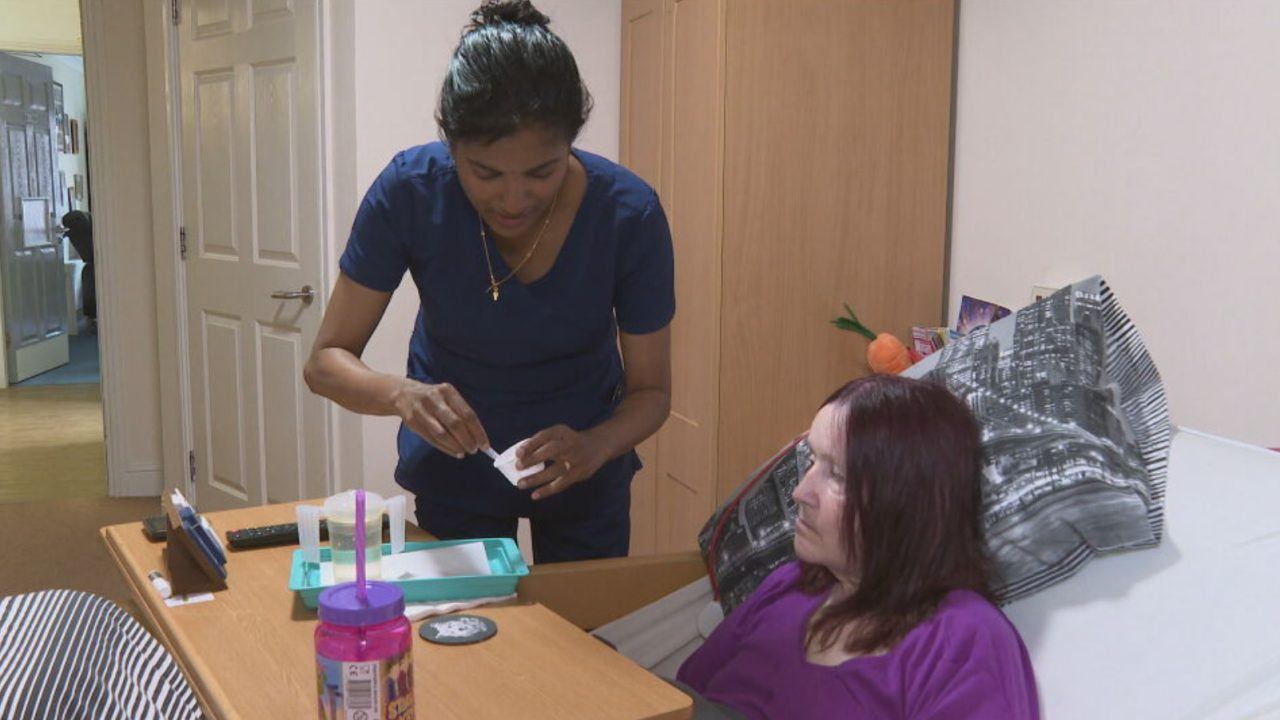Demand for overseas workers has surged as care homes struggle with severe staff shortages, a local recruitment firm has said.
Nurses and carers are being recruited from countries such as Ghana and India to plug gaps in the care system, with pressure mounting due to the effects of Brexit, Covid and widespread workforce retention issues.
Chiefs at Osborne and Allan, which specialises in overseas recruitment for care staff, said it has noticed a “huge jump” in demand over the last 18 months.
Avondale Care Scotland director Adrian Hendry founded Osborne & Allan in 2017 after they began struggling to recruit nurses and staff domestically for their care homes.
The Fife-based firm has brought hundreds over across the whole of the UK since its launch.
He said: “We had recurring adverts but there seemed to be fewer people in the marketplace.
“Unfortunately, people seem to be drawn towards the NHS but not understanding how rewarding and fulfilling working in the care home sector can be.

“I do think we need to look at presenting care home environment in a more positive manner.
“It’s not the cheapest option. It takes around three to six months to recoup investment in a nurse from overseas.
“The benefit of this is longevity and continuity of care delivered.”
Chiefs said “exploitative” agency fees are driving providers to opt for international, permanent staff instead.
The estimated cost of bringing one permanent over from abroad amounts to around three months of fees for an agency nurse.
Mr Hendry said he believes governments at UK and Scotland level could make it easier for migrant workers to come to the UK.
“I think there could be improvements in getting people over here,” he added.
“The governments need to take a look and see who’s doing this on their doorstep and work with us to solve a problem that is affecting everyone nowadays.”
Head of business Samantha Thompson said recruiting foreign workers is “not an overnight fix” but it’s a worthwhile investment.
She explains it takes three months to get nurses and care staff into the UK and a further three months for them to qualify to work – a total of six months.
She said: “It’s not the ideal solution – it’s costly. But when you compare it to the cost of agency staff, you get your money back quite quickly.
“There is now competition in regards to other jobs, even in the supermarket stacking shelves. People can be paid the same money for less emotionally taxing jobs.
“If it’s done right, there’s a return on investment and the residents are happy and looked after.”

Ms Thomson described the care sector as a “leaky bucket” with constant recruitment and retention issues.
“I don’t think there’s any other alternative,” she said. “The title of carer is not held in high regard when it should be. Until it changes, it’s not going to improve.”
Vany Thomas came to Scotland from Kerala, India to work as a care nurse at Benore Care Home in Lochgelly in 2019. She was joined by her husband and three children seven months later.
“I always wanted to have an overseas experience,” she said.
“When I got the chance, I thought this would be the best opportunity. Betterment for my kids and husband.
“I love taking care of older people. I consider them as one of my family members. I love to chat and ask about their past. I really love my job.
“The level of support, care and respect the management give us is brilliant.”
Meanwhile the manager of a Falkirk care home struggling to recruit permanent staff fears the problem will grow worse in the near future.
Elspeth McPhee, manager at St Margaret’s care home in Polmont, said there are 13 vacancies at the care home which remain unfilled and they rely heavily on agency staff for cover.
“Our staff give self sacrificially where they can, but we still rely on agency,” she said.

“I think in the not so very long-term, one of the biggest challenges is that people will find it easier to work for agencies. It gives them full flexibility, more money, it enables them to pick and choose when they’re working.
“I think it’s increasingly going to be harder and harder for people to work in a committed role, working five days out of seven – weekends, late shifts, early shifts.
“It’s going to be increasingly hard from a financial point of view and difficult to sustain going forward.”
Ms McPhee said poor pay in care is putting people off coming into the industry – and it must be addressed to avoid the crisis worsening.
She added: “The government promised £12 an hour sometime in the future. You can almost get that working in Aldi.
“To work in care, you are professionally trained ,working in a skilled, registered workforce where you have to achieve a minimum level of quality while working with people who have complex needs, who can sometimes present quite a challenge.
“I think a lot of people would like to work in care but you can get the same pay in retail with no qualifications.
“I think we need a fair pay for people who are doing complex, difficult jobs. That needs to happen now.”
Care minister Maree Todd said the government has increased social care pay by 14% over a two-year period and are “working hard” to raise it to £12 an hour in line with NHS pay.

Todd said: “Over the past decade there’s been a real programme of professionalising the workforce. All people who work in social care are registered to SSSC and there are continuing professional development offers available to them.
“We’ve done a lot to make sure that people know it’s a really valued, rewarding role.
“We’ve got work going on to advertise to school leavers and other groups who might be dworkinterested in working in social care.
“We also have a package helping care providers to navigate the bureaucratic system that is the immigration system to help people come to Scotland if they want to work in care.”
She added: “I don’t want to give you the impression that it is all is rosy in the garden. A lot of work is needed.
“The workforce is one of the big challenges we have, delivering our vision of social care we want to do in Scotland. It’s an area we really value and absolutely an investment.
“The Scottish Government sees social care as an investment in individuals, communities and families and we’re determined to deliver on that.”
The MSP confirmed ministers are engaging with people with lived experience of social care this summer over plans for a national care service in Scotland.
Ministers have pushed back the first parliamentary vote on the Bill setting up the NCS until after the summer recess in a bid to work on a co-design approach with the public.
Under the plans, adult social care – and potentially other services – would be consolidated into a single body, run by regional care boards who are ultimately responsible to ministers.
The Bill has come under intense scrutiny from opposition parties, trade unions, and local authorities – which are currently responsible for much of the care which would come under the NCS remit.
Asked about the Bill, Todd replied: “If we keep doing the same things, I don’t think we will get the results we need and the transformative change people accessing care keep telling me that they want. I don’t want to over-promise and under-deliver.
“I recently had a meeting with a number of people with lived experience of accessing social care and they are more determined than ever, they are really keen to see change. I am absolutely committed to delivering that change for them.
“I am hopeful over the course of the summer that people take the opportunity to come along, find out what the care service is about and contribute their views. I am determined to build something with lasting impact.”
Follow STV News on WhatsApp
Scan the QR code on your mobile device for all the latest news from around the country


 STV News
STV News



















